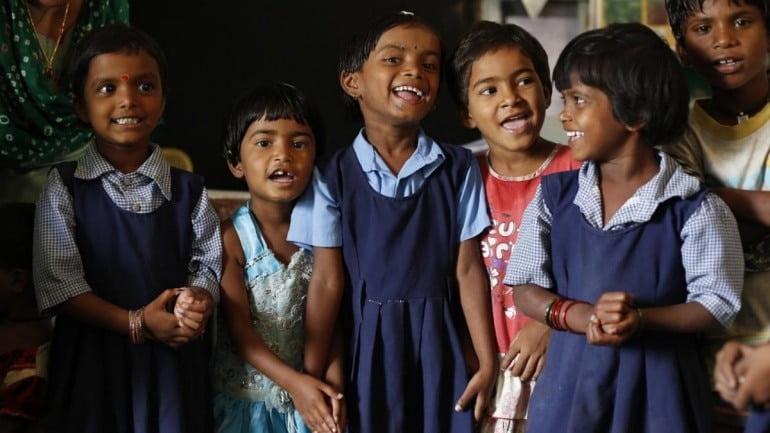
Education in India has witnessed a paradigm shift in recent times. There was once a time when the guru, his knowledge and experience were considered infalliable and total. Today, education is witnessing unprecedented scrutiny from all segments of society. The world is changing at a previously inconcievble pace. We must now understand that we are preparting our children for the unknown, unseen and unpredictable. This is not easy to digest. Therefore, 21st century school education needs to be capable of teaching students how to deal with unpredictability and change.
Goal of modern education:
The goal of modern education is to focus on ensuring that children would be problem solvers, decision makers, and enablers. Students need to leave school with life skills that help them navigate challenges even if they don’t know the solutions to them. Most importantly they need to be comfortable to work with people around them who have different backgrounds and life experiences collabratively.
There is almost no field of pursuit left which is unidimensional or individualistic. Even if you take the most extreme example of a sportsperson pursuing an individual sport such as tennis or atheletics, they need to interface with psychologists, trainers, big data technologists etc and work together as a team.
Skill-based education is the need of the future

Education, broadly speaking, is not just teaching the prescribed syllabus but opening the mind to multiple possibilities, imbibing life skills and preparation for being entrepreneurial, in every walk of life. Entrepreneurship in the classical sense has been focused on venture creation, but venture management and scaling is also a part of the definition, per say, now.
The future is individual learning, customized consumption and smaller learning spaces where students can learn in a fluid environment and can learn from each other – peer learning. The teacher-student relationship will face a dynamic change, when flipped classrooms become a norm rather than an exception in schools.
The ideas will be beyond the textbook and more aligned to the application of knowledge rather than assessment of retention. Flexible learning paths, focus on imparting life skills, student centric learning methods and use of technology are bringing in the concept of “Education 4.0”.
Engaging modern teaching methodology

Modern teaching methodology is focused on thinking and analytical skills. The transferable abstract thinking skills and reflective observation in students helps in developing future careers. The process involves the use of project making, field trips, and facing challenges in a controlled environment. It is the bedrock of future success as it bridges the gap between learning and doing. The discrepancy between theory and practice is overcome. The learning curve is enhanced, and the methodology is instrumental in producing demonstrable mindset and behavioural changes.
It lays the foundation to holistic educational practices that create an environment that facilitates life-long learning, engages the student’s natural curiosity and boosts retention dramatically. The assessment system is also stronger and helps evaluate the core strengths and areas of improvement for every child on a personal level with the use of modern methodology.
Use of technology in the learning program

Technology has enabled improved interaction between communities, and educationists should look at tech as an enabler of greater methodology and new age pedagogy, not as a substitute to the educator. The use of technology to make learning more natural is the key to the future. When our daily lives are empowered by tech, there is no reason that teaching-learning should be deprived of it.
The gap remains when students are taught using only traditional methods, and the workplace is fraught with the use of technology. The student often fails to adapt and flounders, leading to a spectre of being a misfit in the employment jungle. The use of technology in classrooms has led to many positive changes in the learning curve of students. AR/VR, AI, Blockchain is the present, not just the future.
The amalgamation of Artificial Intelligence, Augmented Reality, Automation, Robotics, Virtual Reality, digital marketing, and so forth has revolutionized the education sector. Schools are incorporating laboratories built for these disciplines. The use of technology has fuelled the impact on interdisciplinary learning and research-based innovation.
One must be cognizant to one more thing: you cannot replace human intervention in the classroom. Many ‘consultant’ types have often advised that there should be auto-run lesson plans in a school system, which would make teachers irrelevant. This is a myth. An interaction in the classroom is full of emotions, leadership and team skills, peer learning, classroom management and questioning.
Adaptability for new ideas in the education system

The use of simulations leads to learning being available beyond the brick and mortar classroom. This exponentially increases student engagement and ensures higher retention. The flipped classroom concept where learning goes to the child and not vice-versa has a higher return on investment over the traditional teaching methods. This opens up the vista for new career options that are inherently important for the Industrial Revolution 4.0.
The key is to introduce the child to novel ideas and prepare them for adversity and challenges. The major challenge is to develop not only the students but also the educators. Teacher sensitizing programmes is a need for the future of education.
The ability to adapt to uncertainty, new job roles and responsibilities, schedules and material will form the core of modern education. A smart and dynamic curriculum is the best investment a school can make to prepare students for tomorrow’s knowledge economy.
[“source=indiatoday”]

